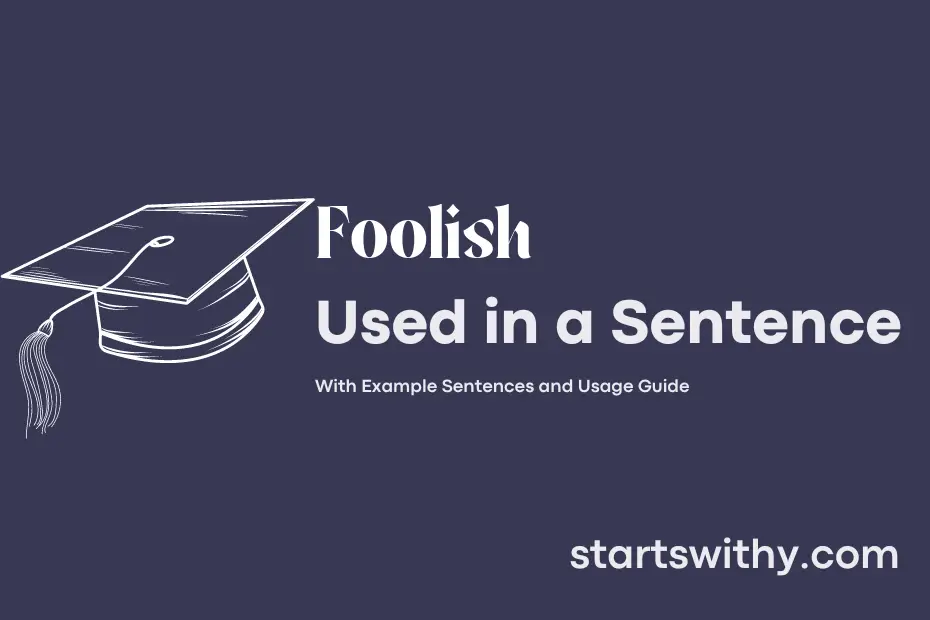Have you ever been called “foolish” for making a poor decision or acting in a silly manner? The term “foolish” is commonly used to describe behavior or actions lacking good sense or judgment. It is often associated with making mistakes or careless errors due to a lack of wisdom or understanding.
When someone is labeled as “foolish,” it implies that their actions are not well-thought-out or rational. This word can carry a negative connotation, suggesting a lack of intelligence or common sense. In everyday conversation, people may use “foolish” to gently criticize someone’s behavior or choices.
7 Examples Of Foolish Used In a Sentence For Kids
- The foolish monkey tried to catch the moon.
- She made a foolish face during the silly game.
- He felt foolish wearing mismatched socks to school.
- The cat did a foolish dance on the fence.
- It is foolish to eat crayons instead of food.
- The boy made a foolish mistake in his math homework.
- Running with scissors is a foolish thing to do.

14 Sentences with Foolish Examples
- Foolish behavior like procrastinating until the last minute often leads to poor grades.
- It would be foolish to skip class just to hang out with friends.
- Spending all your money on clothes instead of textbooks is a foolish decision.
- Staying up all night partying before an exam is a foolish way to prepare.
- It’s foolish to plagiarize someone else’s work instead of doing your own research.
- Ignoring your professor’s advice is a foolish move if you want to succeed in college.
- Skipping important lectures because you think you already know the material is a foolish decision.
- Trying to cheat on an exam is a foolish risk that could lead to serious consequences.
- Believing that you can pass a course without studying is a foolish assumption.
- Failing to ask for help when you’re struggling with a concept is a foolish mistake.
- Participating in dangerous college pranks is a foolish way to impress your peers.
- Trusting unreliable sources for your research papers is a foolish move that can harm your academic reputation.
- Proclaiming that you know everything about a subject when you clearly don’t is foolish bravado.
- Making impulsive decisions without considering the consequences is a foolish habit that can hold you back in your college journey.

How To Use Foolish in Sentences?
To use the word Foolish in a sentence, you can simply follow these steps:
- Understand the meaning of Foolish: Foolish means lacking good sense or judgement, resulting from a lack of wisdom or prudence.
- Choose the appropriate context: Determine the scenario or situation where you want to use the word Foolish.
- Compose your sentence: Incorporate the word Foolish into your sentence to convey the idea of someone acting without good judgement or being unwise.
For example:
- She made a foolish decision by investing all her savings in that risky business venture.
- It would be foolish to go out in a snowstorm without a coat.
- His foolish behavior led to him failing the exam.

Remember to always consider the context in which you are using the word Foolish to ensure it accurately reflects the lack of wisdom or judgement in that situation. Practicing using the word in various sentences will help you become more comfortable incorporating it into your vocabulary effectively.
Conclusion
In conclusion, the use of sentences with the keyword “foolish” helps to highlight actions, decisions, or behaviors that lack wisdom, reasoning, or sound judgment. These sentences often depict situations where individuals act in a careless or thoughtless manner, leading to avoidable consequences. By incorporating “foolish” into sentences, a clear distinction is made between prudent choices and imprudent ones, emphasizing the importance of critical thinking and rational decision-making.
Ultimately, the variety of sentences created with the keyword “foolish” serves as a reminder of the repercussions that can arise from thoughtless actions. Whether cautionary tales or examples of self-inflicted misfortune, these sentences serve as a valuable lesson in recognizing and avoiding behaviors that can lead to regrettable outcomes. Through these examples, the significance of exercising prudence and good judgment in daily decisions is underscored, emphasizing the importance of thoughtful deliberation in navigating life’s challenges.



